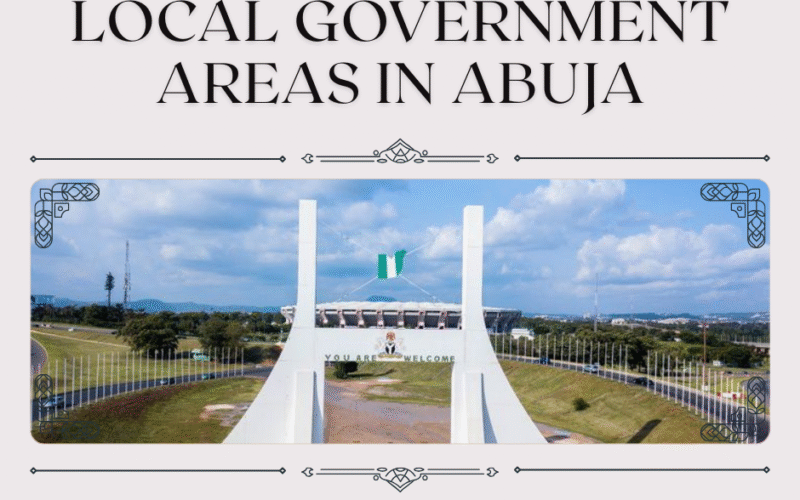The Federal Capital Territory (FCT) of Nigeria is divided into six Local Government Areas (LGAs), each with its own administrative council, cultural heritage, economic activities, and unique landmarks. Below is an in-depth look at each LGA, complete with headquarters, postal codes, major landmarks, demographics, economy, and notable features.
List of Local Government Areas in Abuja
Spanning an area of approximately 7,290 km², the Federal Capital Territory (FCT) is comprised of six (6) local government areas, which are:
- Abaji Local Government Area
- Abuja Municipal Local Government Area
- Bwari Local Government Area
- Gwagwalada Local Government Area
- Kuje Local Government Area
- Kwali Local Government Area
1. Abaji Local Government Area
Headquarters: Abaji
Postal Code: 905101
Overview & History
Located in the southwestern corner of the FCT, Abaji was one of the original districts when Abuja was created in 1976. Predominantly inhabited by the Gbagyi and Bassa people, Abaji retains a strong rural character even as urban spillover from central Abuja increases.
Demographics
- Population: Approximately 58,000 (2006 census)
- Ethnic Groups: Gbagyi, Bassa, and minority Fulani herders
- Religion: Christianity, Islam, and traditional beliefs
Economy & Livelihood
- Agriculture: Major crops include yams, cassava, maize, and vegetables. Poultry and small ruminant farming are common.
- Crafts: Local pottery and weaving workshops supply markets in Abuja.
- Markets: Abaji Main Market operates weekly, drawing traders from surrounding states.
Infrastructure & Services
- Education: A mix of public primary and secondary schools, with vocational training centers in agriculture.
- Healthcare: Abaji General Hospital and several primary health centers serve the area.
- Roads: The Abuja–Keffi highway passes through Abaji, facilitating transport of farm produce.
Landmarks in Abaji
- Abaji Traditional Council Palace – Seat of the Ona of Abaji, custodian of local customs.
- Abaji Main Market – Weekly hub for agricultural and craft trade.
Area Councils (Wards) in Abaji L.G.A
Abaji LGA is divided into 10 wards, each with its own elected councilor.
- Abaji Central
- Abaji North East
- Abaji South East
- Agyana/Pandagi
- Rimba Ebagi
- Nuku
- Alu/Mamagi
- Yaba
- Gurdi
- Gawu
2. Abuja Municipal Area Council (AMAC)
Headquarters: Area 11, Garki, Abuja
Postal Code: 900001
Overview & Significance
AMAC forms the core of Nigeria’s capital, encompassing the Three Arms Zone (Presidential Villa, National Assembly, Supreme Court) and elite districts such as Asokoro, Maitama, Garki, and Wuse. It’s the political, diplomatic, and commercial epicenter of the FCT.
Demographics
- Population: Over 1.4 million (2006 census)
- Ethnic Diversity: Pan-Nigerian (civil servants, diplomats, expatriates)
- Socioeconomic Profile: High-income professionals, government officials, service workers
Economy & Commerce
- Government & Administration: Headquarters of federal ministries and parastatals.
- Retail & Hospitality: Premium shopping malls (The Palms, Jabi Lake Mall), luxury hotels (Transcorp Hilton, NAF Conference Hotel).
- Services: Banking, insurance, consulting, and international NGOs.
Infrastructure & Facilities
- Transport: Good road network, BRT corridors, and proximity to Nnamdi Azikiwe International Airport.
- Healthcare: National Hospital Abuja, several private clinics and specialty hospitals.
- Education: Secondary schools, Abuja University Teaching Hospital, and numerous tertiary institutions.
Landmarks in Abuja Municipal Area Council
- Aso Rock Presidential Villa
- National Mosque & National Christian Centre
- Millennium Park
- Jabi Lake
Area Councils (Wards) in Abuja Municipal Area Council (AMAC)
AMAC is the most urbanized of the six LGAs, with 12 wards covering districts like Garki, Wuse, and Gwarinpa.
- City Centre
- Garki
- Kabusa
- Wuse
- Gwarinpa
- Jiwa
- Gui
- Karshi
- Orozo
- Karu
- Nyanya
- Gwagwa
3. Bwari Local Government Area
Headquarters: Bwari
Postal Code: 901101
Overview & Growth
Nestled northwest of central Abuja, Bwari has transformed from a small town into a burgeoning suburb, driven by real estate developments and the presence of the Nigerian Law School’s Abuja Campus.
Demographics
- Population: ~208,000 (2006 census)
- Ethnic Groups: Gbagyi majority, Hausa-Fulani traders, Yoruba settlers
- Urbanization: Rapid housing estate growth, mixed urban-rural communities
Economy & Livelihood
- Legal Education: Nigerian Law School campus contributes to local economy (housing, services).
- Agriculture & Trading: Smallholder farms, weekly markets, and roadside traders.
- Real Estate: Residential estates like Bwari Extension and Three Arms Zone overflow.
Infrastructure & Services
- Roads: Major link via Bwari–Nyanya Road.
- Education: Nigerian Law School, public primary/secondary schools.
- Healthcare: Bwari General Hospital, private clinics.
Landmarks in Bwari
- Nigerian Law School (Abuja Campus)
- Bwari Polo Cross Resort
Area Councils (Wards) in Bwari L.G.A
Bwari LGA comprises 10 wards, reflecting its mix of urban settlements and rural communities.
- Bwari Central
- Kuduru
- Igu
- Shere
- Kawu
- Ushafa
- Dutse Alhaji
- Byazhin
- Kubwa
- Usuma
4. Gwagwalada Local Government Area
Headquarters: Gwagwalada
Postal Code: 902101
Overview & Expansion
Gwagwalada, southeast of Abuja’s core, has expanded rapidly due to the University of Abuja and affordable housing in Satellite Town and Lugbe. It’s a magnet for students and civil servants seeking proximity to the capital at lower costs.
Demographics
- Population: ~157,000 (2006 census)
- Ethnic Mix: Gbagyi, Yoruba, Igbo, Hausa; youthful population of students
- Settlement Patterns: Dense urban neighborhoods and peri-urban villages
Economy & Commerce
- Education Hub: University of Abuja campus fuels service industries (hostels, eateries).
- Markets: Gwagwalada Main Market serves FCT and neighboring states.
- Health & Services: Gwagwalada General Hospital; private clinics and pharmacies.
Infrastructure & Transport
- Roads: Nnamdi Azikiwe Airport Road and Gwagwalada–Abuja Expressway facilitate movement.
- Housing: Rapid estate development in Lugbe and Dei-Dei.
Landmarks in Gwagwalada
- University of Abuja
- Gwagwalada Main Market
- General Hospital, Gwagwalada
Area Councils (Wards) in Gwagwalada L.G.A
Gwagwalada LGA, home to the University of Abuja, contains 10 wards.
- Gwagwalada Central
- Kutunku
- Staff Quarters
- Ibwa
- Dobi
- Paiko
- Tungan Maje
- Zuba
- Ikwa
- Gwako
5. Kuje Local Government Area
Headquarters: Kuje
Postal Code: 903101
Overview & Environment
West of central Abuja, Kuje combines scenic hills and rural tranquillity with growing urban nodes. The presence of the federal custodial centre adds a unique dimension to its profile.
Demographics
- Population: ~97,000 (2006 census)
- Ethnic Groups: Gbagyi majority, some Fulani
- Settlement: Mixed farmland, small towns, new housing estates around Kuje town
Economy & Livelihood
- Agriculture: Subsistence farming with cassava, maize, vegetables; livestock rearing.
- Brickmaking: Local industry using Kuje’s clay deposits.
- Service Sector: Small markets, local shops along Kuje–Zuba Road.
Infrastructure & Facilities
- Transport: Kuje–Zuba Road is a busy corridor to Niger State.
- Education & Health: Public schools and Kuje General Hospital.
Landmarks in Kuje
- Giri Hills
- Kuje Medium Security Custodial Centre
- Kuje–Zuba Road
Area Councils (Wards) in Kuje L.G.A
Kuje LGA is divided into 10 wards, spanning from Kuje town out into its rural hinterlands.
- Kuje Central
- Chibiri
- Gaube
- Kwaku
- Kabi
- Rubochi
- Gwargwada
- Gudun Karya
- Kujekwa
- Yenche
6. Kwali Local Government Area
Headquarters: Kwali
Postal Code: 904105
Overview & Culture
Covering the northern expanse of the FCT, Kwali is renowned for its pottery tradition and rural landscapes. It’s home to the Royal Palace of the Kpop Hamata, custodian of longstanding cultural heritage.
Demographics
- Population: ~85,000 (2006 census)
- Ethnic Groups: Gbagyi majority; smaller minority tribes
- Community Life: Village-based governance, tight-knit artisan communities
Economy & Arts
- Pottery: Kwali Pottery Village produces traditional earthenware for domestic use and export.
- Agriculture: Yam, maize, and vegetable cultivation around the villages.
- Tourism: Art enthusiasts visit workshops; day-trippers head to nearby Gurara Waterfalls.
Infrastructure & Services
- Roads: Kwali–Keffi Road connects to Nasarawa State.
- Education & Health: Public primary/secondary schools; Kwali Health Centre.
Landmarks in Kwali
- Kwali Pottery Village
- Gurara Waterfalls (nearby)
Area Councils (Wards) in Kwali L.G.A
Kwali LGA’s 10 wards include the famed Kwali Pottery Village and surrounding communities.
- Kwali Ward
- Yangoji
- Pai
- Kilankwa
- Dafa
- Kundu
- Ashara
- Gumbo
- Wako
- Yebu
In Conclusion
Each of the six Local Government Areas in Abuja, the Federal Capital Territory, contributes uniquely to Abuja’s identity—balancing modern governance and commerce in AMAC with the rich cultural traditions and agricultural livelihoods of Abaji, Bwari, Kuje, and Kwali, and the academic vibrancy of Gwagwalada. Understanding these LGAs offers a deeper appreciation for how Nigeria’s capital harmonizes urban development with rural heritage.






